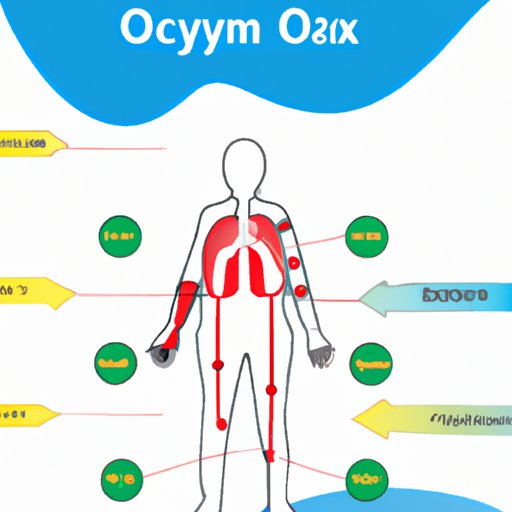Introduction
In order to survive and thrive, humans rely on a constant supply of oxygen. Oxygen is essential for energy production, cellular respiration, and maintaining a healthy immune system. Understanding the role of oxygen in the human body and how it travels through the body is important for maintaining health and identifying potential issues with oxygen delivery. This article will explore the journey of oxygen through the human body, from its entry into the body to its delivery to cells.

The Journey of Oxygen Through the Cardiovascular System
The cardiovascular system is responsible for transporting oxygen through the body. The heart pumps blood through arteries, veins, and capillaries, which are tiny blood vessels where the exchange of oxygen and other gases takes place. The walls of these vessels are made up of thin layers of cells that allow oxygen to pass from the bloodstream into surrounding tissue.
The blood vessels also contain red blood cells, which transport oxygen throughout the body. These cells have an iron-rich protein called hemoglobin that binds to oxygen molecules and carries them through the bloodstream. As the blood moves through the body, it delivers oxygen to the organs and tissues that need it.

Understanding the Respiratory System and Its Role in Oxygen Delivery
The respiratory system is responsible for bringing oxygen into the body. The process of oxygenation begins when air enters the lungs through the nose or mouth. Once inside the lungs, oxygen passes through the air sacs and into the bloodstream, where it is transported to the rest of the body.
The lungs also help regulate the amount of oxygen in the bloodstream. During times of physical activity, the lungs take in more oxygen to meet the body’s increased needs, while during periods of rest they take in less. This ensures that the body is always supplied with enough oxygen to meet its needs.

Examining the Effects of Oxygen Deprivation on the Human Body
When the body does not receive enough oxygen, it can lead to a condition known as hypoxia. Hypoxia can have serious consequences, including damage to the brain, heart, and other organs. Signs and symptoms of hypoxia include confusion, dizziness, fatigue, and shortness of breath.
Oxygen deprivation can also have an impact on organ systems. When there is not enough oxygen available, organs may not be able to function properly. This can lead to organ failure, stroke, and even death in extreme cases.
Investigating the Impact of Oxygen Deficiency on Cellular Function
Low levels of oxygen can also have an effect on cellular function. Cells require oxygen to produce energy and carry out their normal functions. When oxygen levels drop too low, cells cannot effectively produce energy and their metabolism slows down, leading to decreased performance.
Long-term oxygen deprivation can also have serious consequences. Prolonged lack of oxygen can cause cell death and damage to tissue, which can lead to organ failure and other medical complications.
Conclusion
Oxygen is essential for life, and understanding how oxygen travels through the body is important for maintaining health. The cardiovascular system transports oxygen throughout the body, while the lungs bring oxygen into the body and regulate its levels in the bloodstream. Low levels of oxygen can lead to hypoxia, which can have serious consequences on organ systems and cellular function. By understanding the journey of oxygen through the body, we can better identify potential issues with oxygen delivery and take steps to ensure our bodies remain in optimal health.
(Note: Is this article not meeting your expectations? Do you have knowledge or insights to share? Unlock new opportunities and expand your reach by joining our authors team. Click Registration to join us and share your expertise with our readers.)
